Human, Mouse, and Rat Anti-Cytokeratin 14 Antibody Product Attributes
Species: Human, Mouse, and Rat
Tested Applications: Flow Cytometry, Immunofluorescence, Immunohistochemistry (IHC).
Application Notes: Flow Cytometry (0.5-1ug of antibody/million cells in 0.1ml), Immunofluorescence (0.5-1ug of antibody/ml), Immunohistochemistry (IHC) (Formalin-fixed) (0.5-1.0ug of antibody/ml for 30 min at RT)
Clonality: Monoclonal
Anti-Cytokeratin 14 Antibody Clone: LL002
Clone LL002 Host and Isotype: Mouse IgG3
Anti-Human, Mouse, and Rat Cytokeratin 14 Positive Control Sample: A431 cells. Skin or Squamous cell carcinoma
Cellular Localization of Antibody Cytoplasmic
Buffer and Stabilizer: 10mM PBS with 0.05% BSA & 0.05% azide.
Antibody Concentration: 200ug/ml
Antibody Purification Method:Protein A/G Purified
Immunogen: A synthetic peptide of 15 amino acid from the C-terminus of human keratin 14.
Storage Conditions: Store at 2 to 8° C (refrigerate). Stable for 24 months when properly stored.
Cytokeratin 14 Previously Observed Antibody Staining Patterns
Observed Subcellular, Organelle Specific Staining Data:
Anti-KRT14 antibody staining is expected to be primarily localized to the intermediate filaments. There is variability in either the signal strength or the localization of signal in intermediate filaments from cell to cell.Observed Antibody Staining Data By Tissue Type:
Variations in Cytokeratin 14 antibody staining intensity in immunohistochemistry on tissue sections are present across different anatomical locations. An intense signal was observed in epidermal cells in the skin, myoepithelial cells in the breast, squamous epithelial cells in the cervix and uterine, esophagus, oral mucosa, tonsil and vagina. More moderate antibody staining intensity was present in epidermal cells in the skin, myoepithelial cells in the breast, squamous epithelial cells in the cervix and uterine, esophagus, oral mucosa, tonsil and vagina. Low, but measureable presence of Cytokeratin 14 could be seen inglandular cells in the breast. We were unable to detect Cytokeratin 14 in other tissues. Disease states, inflammation, and other physiological changes can have a substantial impact on antibody staining patterns. These measurements were all taken in tissues deemed normal or from patients without known disease.Observed Antibody Staining Data By Tissue Disease Status:
Tissues from cancer patients, for instance, have their own distinct pattern of Cytokeratin 14 expression as measured by anti-Cytokeratin 14 antibody immunohistochemical staining. The average level of expression by tumor is summarized in the table below. The variability row represents patient to patient variability in IHC staining.| Sample Type | breast cancer | carcinoid | cervical cancer | colorectal cancer | endometrial cancer | glioma | head and neck cancer | liver cancer | lung cancer | lymphoma | melanoma | ovarian cancer | pancreatic cancer | prostate cancer | renal cancer | skin cancer | stomach cancer | testicular cancer | thyroid cancer | urothelial cancer |
|---|---|---|---|---|---|---|---|---|---|---|---|---|---|---|---|---|---|---|---|---|
| Signal Intensity | - | - | ++ | - | - | - | ++ | - | - | - | - | - | - | - | - | +++ | - | - | - | - |
| KRT14 Variability | + | + | ++ | + | + | + | ++ | + | ++ | + | + | + | + | + | + | + | + | + | + | ++ |
Limitations and Warranty
enQuire Bio's Cytokeratin 14 Anti-Human Monoclonal is available for Research Use Only. This antibody is guaranteed to work for a period of two years when properly stored.
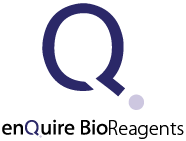
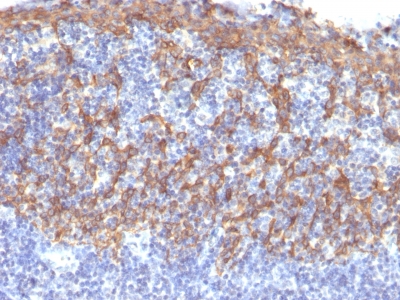


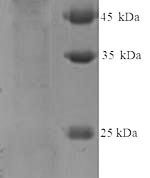
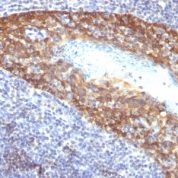
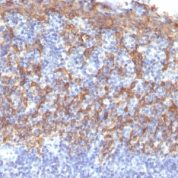
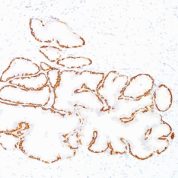
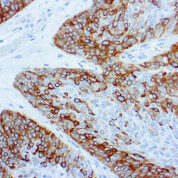
There are no reviews yet.